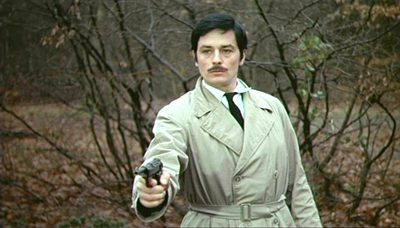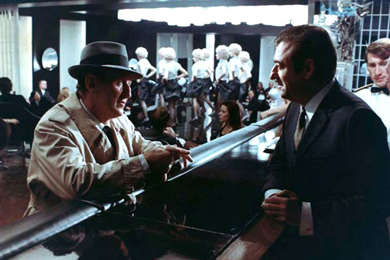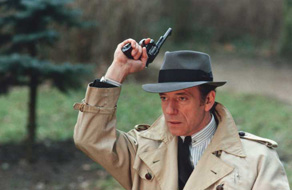
 |
|
|
|
Criterion continues to double back on its impressive list of Jean-Pierre Melville thrillers with this stunning Blu-ray of his penultimate feature film. Le cercle rouge is another ascetic, stylized police-vs-crooks story in the same vein as his avowed masterpiece Le Samouraï from a few seasons earlier. Like other later Melville films, it's a ritualized, unemotional and deliberately-paced caper story that builds on familiar but absorbing characters. 
The story is a linear, intense narrative of criminal activity. Hotshot Corey (Alain Delon) leaves prison and embarks immediately on a new crime. He just happens to link up with Vogel (Gian-Maria Volonté), a fugitive who has escaped right after sentencing. Their plan is to knock over a jewelry showroom equipped with numerous sophisticated alarms. To do the job they enlist Jansen (Yves Montand), an alcoholic ex-cop who prides himself on his marksmanship. Opposing them is the pragmatic Captain Mattei (André Bourvil), a plodder who knows he'll catch them in the end -- he's not above blackmail to secure the information he needs. Melville's last film is the very uneven Un Flic. It has some atmospheric action scenes but is very sloppy in some departments, especially special effects. Worse, it miscasts Alain Delon as a terse inspector and American Richard Crenna as an impassive criminal, instead of the other way around. Le cercle rouge plays it straight and predictable all the way through. It was written in the early 50s in response to Melville's favorite film The Asphalt Jungle, but was put off for twenty years by the success of caper pictures like Du rififi chez le hommes. Interviewed in the extras. Melville characterizes himself as an action director, but Le cercle rouge hasn't much action. It's more of a meditation on the caper picture, with stylized characters we must study to understand. They turn out to be exactly as advertised. The crooks played by Delon and Volonté convey their pasts through their eyes, but other than a couple of details, we know almost nothing about them. A possible plot thread is suggested when Delon seems embittered by a girl he left behind (Ana Douking), who is now sleeping with the mob boss he protected with silence while in prison. The tangent really doesn't go anywhere -- she has an early nude scene but then disappears. 
The fallen cop played by Yves Montand is shown a bit more deeply. We witness his D.T.s as colorful snakes, spiders and lizards crawl into his room while he sleeps, but the lighting of this scene defuses any threatening feeling it might have. Yet Jansen's specific problem with the police force -- why he's willing to pull off the crime -- is never explained except as therapy for his alcoholism. Jansen's obsession with marksmanship and the special bullets he uses to 'pick a lock' are nicely-observed, as is his simply sniffing a liquor flask to steady his nerves during the crime. Equally interesting is the cop on the case played by André Bourvil. Mainly known as a comedian, Bourvil is especially good in this serious role as a deadpan inspector who uses crooked means when necessary. He pampers his cats and nurses his snitches out on the street, but he's no more lovable than the crooks, as seen when he frames nightclub owner Francois Périer's son on a narcotics rap to extort the man's cooperation. These classic French crime films seem even more in love with fate and doom than their American noir inspirations. Le cercle rouge surprises us by being downright pedestrian when it comes to spelling out its theme. A grim Police Comissioner tells Bourvil that all men are wicked and that includes cops and robbers. Before this is proven we hear several more verbal repetitions of the same idea. Some plot contrivances are fun. Delon, free from prison, hooks up with Volonté, an escapee on his way to prison. Others a bit clunky. Melville omits any female presence in the story except for a brief and unrewarding glimpse of Delon's ex-moll at the beginning, a stage-ful of joyless cabaret dancers, and a young waitress who presents Delon with a red rose before the final chapter. Action fans waiting for something to happen will smell symbolism and become resentful. 
I liked the look of the film, which maintains a cool and dark surface. The lighting is almost too restrained (as in the aforementioned D.T.'s sequence) but the cold and comfortless streets are a nice switch from glitz and hype -- this caper is the anti- Ocean's Eleven. Some of the cutting is questionable, with some jerky continuity here and there. When Montand decides to bypass the fancy gun tripod and make his all-important rifle shot by hand, the rapid cuts to his comrades doing double-takes at each other look too much like filmmaking 101 ... Melville's framing and shot choice, at least in this film, aren't all that distinctive. After some fairly interesting caper action disarming a jewelry store's many security devices (with the robbers wearing The Green Hornet look-alike masks), the wrap-up is appropriately muted. The crooks' dedication to their own professionalism causes them to be loyal to the bitter end, in a Wild Bunch-like gesture toward male fidelity. Melville may see himself as a man's man of directors, but here the style and ritual don't quite overcome the familiarity of events -- these men generate little emotional charge. We enjoy Le cercle rouge and admire many scenes and character details, but it's no Asphalt Jungle, just a French echo. Criterion's Blu-ray of Le cercle rouge improves on their DVD from 2003 with a transfer that makes what seemed rather flat cinematography much more dynamic. Many scenes take place at night or just before dawn, with gray-garbed men running against dank backgrounds of crowded buildings, or dark meadows and trees. HD's higher contrast ratio keeps these backgrounds from turning into visual mush, essentially reviving the film's special look. 
The extras ported over from the first disc release quite possibly show too much of the film's Stetson-hatted French director. The long interviews with Melville, his actors and his assistant director eventually become a bit too much -- after a while we stop learning much of anything new about a filmmaker who simply loves American crime pictures and big American cars, in that order. Author Rui Nogueira's interview input seems mostly about his relationship with the director. The essays in the insert booklet are much more focused on this very special French filmmaker. An 'appreciation' from John Woo is present as well. Le cercle rouge is not my favorite Jean-Pierre Melville picture, but now that Criterion has released so much of his output, the director's vaunted reputation now seems well deserved.
On a scale of Excellent, Good, Fair, and Poor,
Le cercle rouge Blu-ray rates:
Reviews on the Savant main site have additional credits information and are often updated and annotated with reader input and graphics. Also, don't forget the 2010 Savant Wish List. T'was Ever Thus.
Review Staff | About DVD Talk | Newsletter Subscribe | Join DVD Talk Forum |
| ||||||||||||||||||